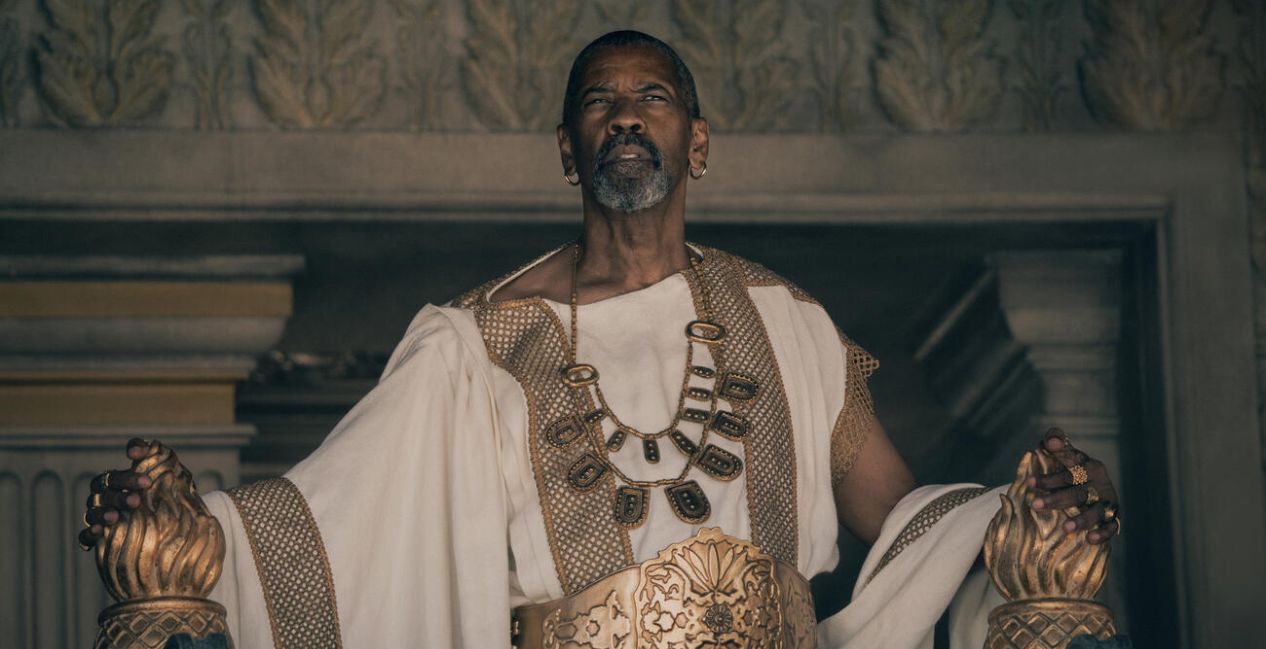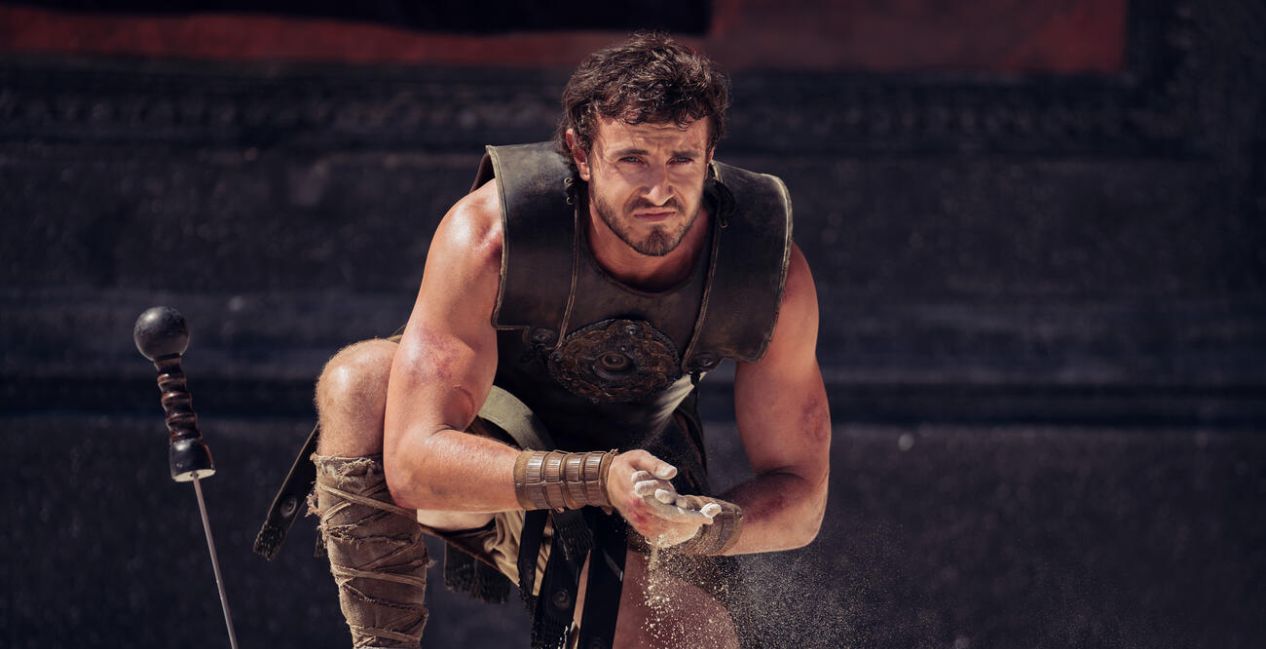In a career defined by sweeping visions of the ancient past and the dystopic future, director Ridley Scott is no stranger to crafting impactful escapist fare. His follow-up to the multi-Oscar-winning Gladiator, the aptly titled Gladiator II, which arrives more than two decades later, follows in that same tradition but offers none of the thematic resonance. Yet, what would be a death knell for similar epics proves to be the film’s greatest strength.
By forgoing any attempts at great narrative or intellectual depth, Gladiator II proves to be a synthesis of the most exciting and unabashedly fun elements of the swords-and-sandals epics that inspired it, including its immediate predecessor. Like the ruling class of its depicted era, Gladiator II offers audiences the bread and circuses they crave, nothing more and nothing less. The result is one of Scott’s most purely entertaining films in years—one that feels empowered by its campier and more ridiculous elements rather than burdened by them as he was in recent efforts like House of Gucci or Napoleon.
By feeding viewers a steady diet of wild spectacle and delectable performances, they embody the masses the Roman Republic sought to appease in the Colosseum. The utter lack of profundity and inability to dissect promising concepts quickly become minor quibbles as we settle into our seats and prepare to take in Scott’s simultaneously schlocky, serious, silly, and stupefying tale of revenge.
Set two decades after the events of the original, Gladiator II centres on Lucius (Paul Mescal)—the son of Maximus and Lucilla (Connie Nielsen)—who lives a simple and humble life with his wife in Numida. After a Roman invasion led by General Marcus Acacius (Pedro Pascal) leaves his wife dead and him a slave, Lucius resolves to follow in his Father’s footsteps as a Gladiator, serving under the Machiavellian Macrinus (Denzel Washington) while taking the fight to Acacias, who unbeknownst to him is married to his estranged mother, and the young, tyrannical emperors Geta (Joseph Quinn) and Caracalla (Fred Hechinger).

Gladiator II follows many of the beats of the original, at times too closely. Still, Scott and screenwriter David Scarpa inject enough political intrigue and dramatic character dynamics to keep the story absorbing. While far from complex, the two-pronged narrative of violent duels and political scheming makes for a full-bodied experience full of melodrama and moments of pause and consideration. The object of Lucius’ vengeance, Acacias, is not an evil warmonger but a pawn of such rulers, deeply tired of eternal conflict and a man who, above all, loves and cares for his wife.
Lucius’s owner, Macrinus, is a former slave-turned-slaver who becomes party to the very system and order that ensnared him to ultimately conquer it. While Gladiator II lacks the heft and depth to truly unfurl these fascinating wrinkles, the contemplative morsels it does offer adds enough flavour to the breathtaking and often ludicrous spectacle that surrounds it.
From a clash with ravenous baboons to a rampaging Rhino to an outlandish naval battle, the film’s action set pieces radiate a breathtaking and outrageous aura. Intricate and grand, intimate and epic, each battle is captured with great skill and ingenuity. There’s a volatility and unpredictability baked into each sequence that renders it so riveting and immersive.
Like the huddled masses of the Colosseum, we take joy in each blow, slice, and decapitation, relishing the visceral and guttural pleasures at each turn. Scott trades the original’s more tragic, mournful undercurrent for a shameless exercise in big-budget camp. The wild and outlandish swings embedded within Gladiator II satisfy a primal itch most blockbusters fear to scratch.

Yet, for all its sanguineous wonders, Scott captures a Rome that is both glorious and starkly beautiful. While an incredibly indulgent production, full of impossibly ornate and decadent chambers, it carries a majestic and solemn image of an empire in shambles. Scott’s sunken kingdom is nothing short of awe-inspiring, even if it forgoes historical accuracy in favour of more immaculate and inauthentic pleasures.
The figures populating these decadent spaces prove to be equally enamouring. After proving himself an indie darling, Mescal rises to bonafide star in a layered performance. Mescal invests in a soulfulness that separates him from the more one-note stoicism of Russell Crowe’s Maximus. Seamlessly shifting from feral rage to immense sadness to gentle wit, Mescal’s delivery lands with great impact—especially in a scene where he coldly recites Virgil.
While Quinn and Hechinger’s emperors initially feel like a retread of Joaquin Phoenix’s evil Commodus—and, by extension, a stereotype of Nero or Caligula— they impart enough of their own quirks and inflections to remain captivating and darkly comical. Yet, it’s Washington who steals the show. In a subtle and scenery-chewing performance, he transfixes as a Janus-faced schemer who is easy to love and hard to hate—Pascal and the returning Nielsen round out the ensemble with a great dose of theatricality.
While far from profound, Gladiator II is simply too entertaining and sweeping to ignore. The bones of a much richer and weightier epic appear throughout Scott’s film but are quickly buried in favour of pure, unadulterated spectacle. Sure, Gladiator II might not be a transformative piece of filmmaking, but sometimes it’s too tempting to cheer on the madness.
Gladiator II is in theatres on November 22, 2024.
Gladiator II
7.5/10
TL;DR
While far from profound, Gladiator II is simply too entertaining and sweeping to ignore.

